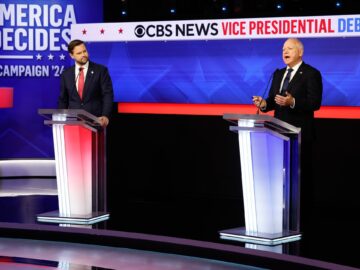Benjamin Wallace-Wells in The New Yorker:
 Vice-Presidential debates are normally for the archives: the transcript gets recorded and then filed away. Strain your memory and try to recall: Who won the debate between John Edwards and Dick Cheney? Biden-Ryan? Even Harris-Pence, just four years ago? In the rush of the Presidential race, these events were simply speed bumps. The best way to approach Tuesday night’s version was with a certain measure of historically earned skepticism. Was there any reason to think that this Vice-Presidential debate would actually matter—would even be remembered—by Election Day, now a little more than a month away, when so few have in the past?
Vice-Presidential debates are normally for the archives: the transcript gets recorded and then filed away. Strain your memory and try to recall: Who won the debate between John Edwards and Dick Cheney? Biden-Ryan? Even Harris-Pence, just four years ago? In the rush of the Presidential race, these events were simply speed bumps. The best way to approach Tuesday night’s version was with a certain measure of historically earned skepticism. Was there any reason to think that this Vice-Presidential debate would actually matter—would even be remembered—by Election Day, now a little more than a month away, when so few have in the past?
Maybe not. But during ninety remarkably fast-talking minutes in New York—verbally, both candidates are speed demons—the Ohio senator J. D. Vance moved the narrative of the race in a small but perceptible way toward the Republican side. Vance was first to every touchstone that mattered—the first to introduce himself personally to the American people and to bring up the meagre and pressured working-class circumstances in which he was raised, the first to insist that his was the ticket to favor “clean air” and “clean water,” the first to credit his running mate, Donald Trump, with an “economic boom unlike we’ve seen in a generation in this country.” His intent seemed simple—to persuade voters, who are broadly dissatisfied with the direction of the country, that the Democrats are largely responsible for it. But Vance also had an advantage in cunningness. The young senator even managed to turn around a question on family separation, one of the more reprehensible episodes of the Trump years. “Right now in this country . . . we have three hundred and twenty thousand children that the Department of Homeland Security has effectively lost,” he said. “The real family-separation crisis is unfortunately Kamala Harris’s wide-open southern border.”
More here.
Enjoying the content on 3QD? Help keep us going by donating now.
